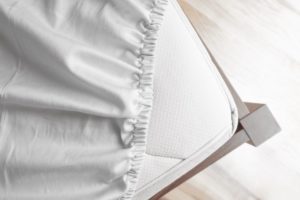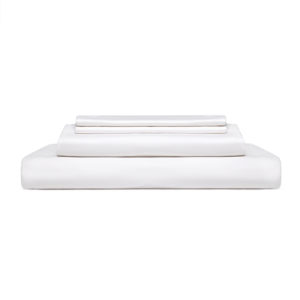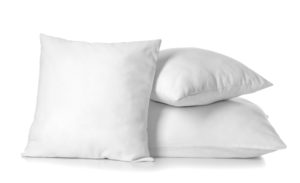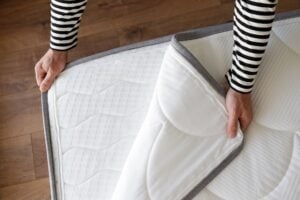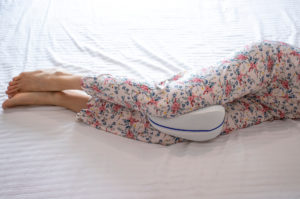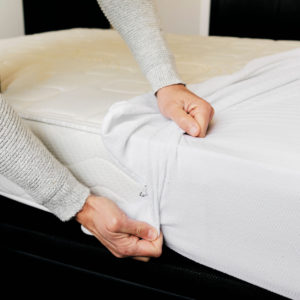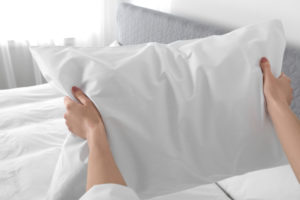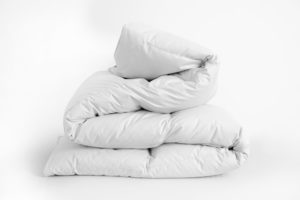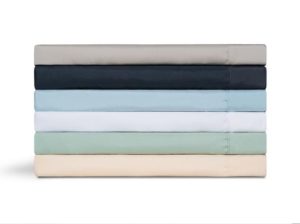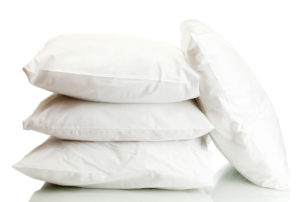Weighted Blanket Benefits
Many people find that adding a weighted blanket to their sleep routine helps to reduce stress and promote calm. In the same way as a hug or a baby’s swaddle, the gentle pressure of a weighted blanket may help ease symptoms and improve sleep for people with insomnia, anxiety, or autism.
What Is a Weighted Blanket?
Weighted blankets are designed to be heavier than normal blankets. There are two styles of weighted blankets: knitted and duvet style. Duvet-style weighted blankets add weight using plastic or glass beads, ball bearings, or other heavy fill, whereas knitted weighted blankets are woven using dense yarn.
A weighted blanket can be used on the bed, couch, or anywhere you like to relax.
Weighted Blanket Benefits
Weighted blankets take their inspiration from a therapeutic technique called deep pressure stimulation, which uses firm, controlled pressure to induce a feeling of calm. Using a weighted blanket may have subjective and objective benefits for sleep.
Provide Comfort and Security
Weighted blankets are said to work in the same way a tight swaddle helps newborns feel snug and cozy. Many people find these blankets help them doze off more quickly by promoting a sense of security.
Ease Stress and Soothe Anxiety
A weighted blanket may help manage feelings of stress and anxiety. Since stress and anxiety often interfere with sleep, the benefits of a weighted blanket may translate to better sleep for those suffering from stressful thoughts.
Improve Sleep Quality
Weighted blankets use deep pressure stimulation, which is thought to stimulate the production of a mood-boosting hormone serotonin, reduce the stress hormone (cortisol), and increase levels of melatonin, the hormone that helps you sleep. This may help improve overall sleep quality.
Calm The Nervous System
An overactive nervous system can lead to anxiety, hyperactivity, rapid heart rate, and shortness of breath, which are not conducive to sleep. By distributing an even amount of weight and pressure across the body, weighted blankets may calm the fight-or-flight response and activate the relaxing parasympathetic nervous system in preparation for sleep.
Although many people report improvements from these popular blankets, there is debate as to whether weighted blankets offer all of the benefits that manufacturers claim. As with any product touting medical benefits, it’s wise to proceed with caution.
Anyone who has persistent sleep problems should talk with a doctor, who can best assess their situation and determine whether a weighted blanket could be an effective part of a comprehensive treatment approach.
Who Can Benefit from Using a Weighted Blanket?
Weighted blankets have potential benefits for all kinds of sleepers, especially those who experience a high amount of stress or who have certain medical conditions. In particular, weighted blankets may provide therapeutic benefits for those with autism, anxiety, depression, and attention deficit hyperactivity disorder (ADHD).
Anxiety and Depression
Many people with anxiety and depression find themselves trapped in a vicious cycle. Anxiety and depression can negatively affect sleep, and in turn, the lack of sleep exacerbates anxiety and depressive symptoms. The soothing effects of a weighted blanket may help improve sleep for people with these mental health conditions. One study found that weighted blankets helped reduce insomnia symptoms for people with anxiety, depression, bipolar disorder, and ADHD.
Autism Spectrum Disorders
By activating the sense of touch, a weighted blanket may help people with autism spectrum disorders focus on the deep pressure of the blanket instead of other sensory stimuli from their surroundings. This pressure may provide comfort and allow them to relax even in situations that may be over-stimulating. Despite a lack of research on the objective benefits for sleep, children with autism often prefer to use a weighted blanket.
Are Weighted Blankets Safe?
Weighted blankets are generally considered safe, as long as the person using the blanket has enough strength and physical dexterity to lift the blanket off themselves when necessary to prevent suffocation or entrapment.
Some sleepers should take extra precautions and speak to their doctor before using a weighted blanket. A weighted blanket may be unsuitable for people with certain medical conditions, including chronic respiratory or circulatory issues, asthma, low blood pressure, type 2 diabetes, and claustrophobia. Experts also recommend that people with obstructive sleep apnea (OSA) avoid using weighted blankets, because the weight of a heavy blanket may restrict airflow.
Though there are some weighted blankets specifically designed for children, infants and toddlers should not use weighted blankets as they run the risk of becoming trapped underneath.
How To Choose the Right Weighted Blanket
Most people prefer a weighted blanket equivalent to about 10% of their body weight, though you should take your own preferences into consideration when looking for a weighted blanket. Weighted blankets are sold in weights ranging from 7 pounds to 25 pounds, and they typically come in standard bedding sizes such as twin, full, queen, and king. Some manufacturers also make child- or travel-size weighted blankets.
Weighted blankets are more expensive than regular throw blankets, usually between $100 to $300. The more expensive models tend to be made with more durable materials and may offer better breathability or other features.

Still have questions? Ask our community!
Join our Sleep Care Community — a trusted hub of sleep health professionals, product specialists, and people just like you. Whether you need expert sleep advice for your insomnia or you’re searching for the perfect mattress, we’ve got you covered. Get personalized guidance from the experts who know sleep best.



